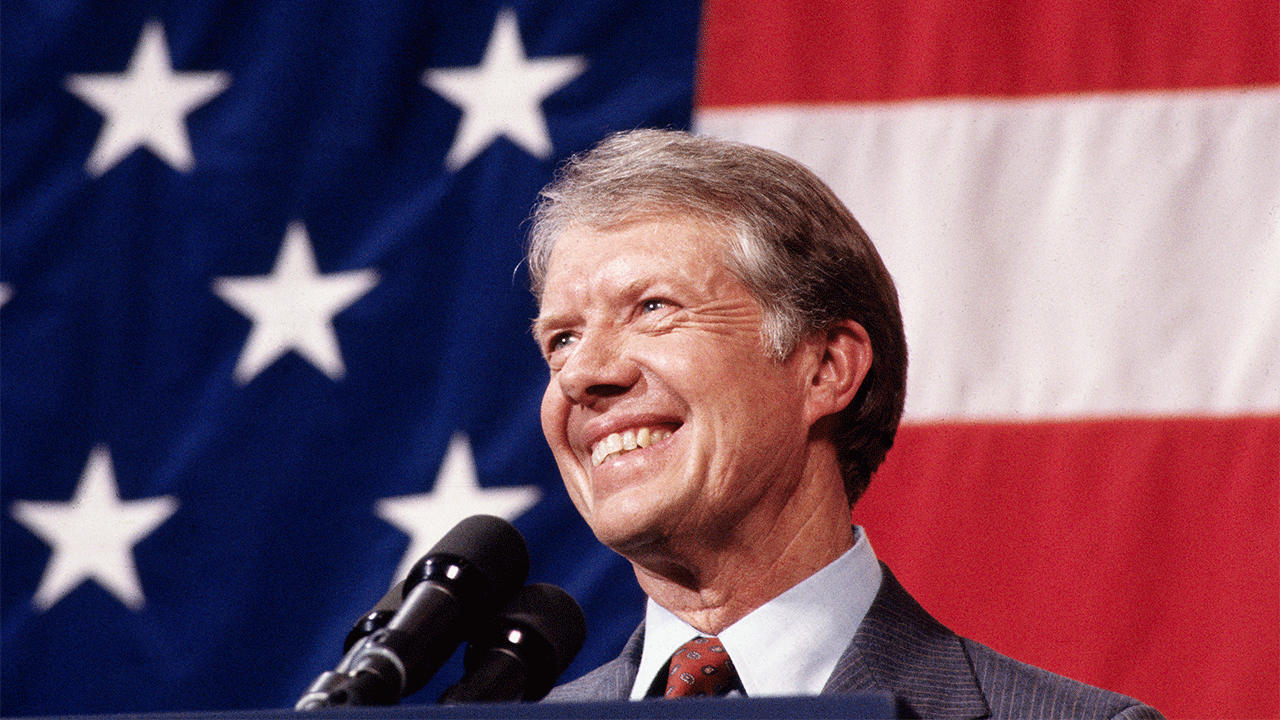NEWYou can now listen to Fox News articles!
While “From a Peanut Farm to the Presidency” often serves as the standard description of Jimmy Carter’s political career, reducing his life to those two hallmarks does a disservice to a legacy seeped deeply in humanity and a sense of genuine compassion.
In his attempt to exemplify one of his favorite biblical passages, Ephesians 4:32, which says, “Be kind and compassionate to one another, forgiving each other just as in Christ God gave you,” Carter stood as a beacon of honesty and decency in our divided American body politic.
At a time when cynicism, division, mistrust and a greater sense of apathy seem to dominate our national discourse, Carter’s life should remind us of what is possible when we lead with principle, tolerance and a steadfast belief in the power of honest dialogue.

President Jimmy Carter addresses a town meeting in Elk City, Oklahoma, March 24, 1979. (Getty Images)
Running for president in the shadow of the Watergate scandal and President Richard Nixon’s ultimate resignation, Carter’s 1976 campaign revived hope in government and extended to the electorate a belief in unwavering integrity.
WHAT JIMMY CARTER CAN TEACH US ABOUT LIFE AND OUR LEGACY
Carter kept his famous pledge to never lie to the American people, all at the cost of his re-election in 1980. His candor, unique to a city where people play politics and twist the truth, was not a political tactic but an expression of his deeply rooted Christian values.
Many of today’s politicians continue to express these values under the evangelical banner. However, for Carter, a U.S. Naval Academy graduate and lieutenant in the Navy’s submarine division, truth was not negotiable. Instead, it was the foundation of leadership that appeared throughout his years in government service.
Carter’s political career started in the Georgia state Senate. That’s where he, a Plains business owner, father and avid churchgoer, rose to national prominence by embracing complexity and navigating change while not losing his sense of self.
JIMMY CARTER PROVIDED A MODEL FOR THE POST-PRESIDENCY
When Carter ran for governor of Georgia, he recognized the profoundly entrenched divisions in his home state. He understood the art of politics – not as a tool for manipulation but a means of bringing people together. He reached across ideological lines to earn the trust of Georgia’s segregationists, not to pander but to create an opportunity for dialogue and, ultimately, transformation.
Once in office, Carter set out to dismantle segregation and champion civil rights, proving that political courage can coexist with pragmatism. This unique bridge-building ability extended well beyond Georgia and defined Carter’s presidency. Whether he was negotiating the Camp David Accords between Egyptian President Anwar Sadat and Israeli Prime Minister Menachem Begin or promoting human rights on the global stage, Carter showed that diplomacy and conversation could achieve what threats and ultimatums could not.
JIMMY CARTER, PIONEER OF THE RELIGIOUS RIGHT
His belief in dialogue was rooted in faith – faith in God, humanity and the moral arc of the universe bending toward justice. This belief in the power of the American people pushed Carter to establish the Department of Education and the Department of Energy.
Carter also uplifted and empowered women in government service. He set the stage for President Bill Clinton, decades later, to elevate Ruth Bader Ginsburg to the U.S Supreme Court and Alexis M. Herman as the first African American U.S. labor secretary, by nominating Ginsburg, then an American Civil Liberties Union attorney, to the U.S. Courts of Appeals and appointing Herman, a former women’s and civil rights leader, as director of the Labor Department’s Women’s Bureau.
While stagflation and a months-long hostage crisis cost Carter his chance at re-election, he served as a global humanitarian outside the White House, driven by his unshakeable faith and unwavering belief in what is possible when folks come together.
CLICK HERE FOR MORE FOX NEWS OPINION
Pushed by purpose and undergirded by a belief in equity and justice for all the world’s people, Carter, as a global citizen, helped provide treatment for Guinea worm disease, river blindness, malaria and other ailments. Through his work at the Carter Center, he tirelessly promoted peace, free elections worldwide, and dialogue in Haiti and Cuba.
Earning a Nobel Peace Prize in 2002, Carter has taught us all that leadership is not confined to titles and terms but measured by actions and impact.
In today’s polarized political environment, Carter’s life provides a roadmap for healing. He showed us how to lead with humility and grace, engage in conversations even when they are uncomfortable, and prioritize the common good over personal ambition.
CLICK HERE TO GET THE FOX NEWS APP
At a time when compromise is often viewed as a weakness, Carter’s example reminds us that finding common ground is an act of strength. President Jimmy Carter’s story is ultimately a story of faith – in America, in humanity, and in the idea that we are stronger when we are united.
As we mourn his passing, we must also celebrate his legacy by embracing his values – honesty, integrity and a relentless commitment to justice. We must remember that dialogue is not an admission of defeat but a declaration of hope.
CLICK HERE FOR MORE FROM RICHARD FOWLER
